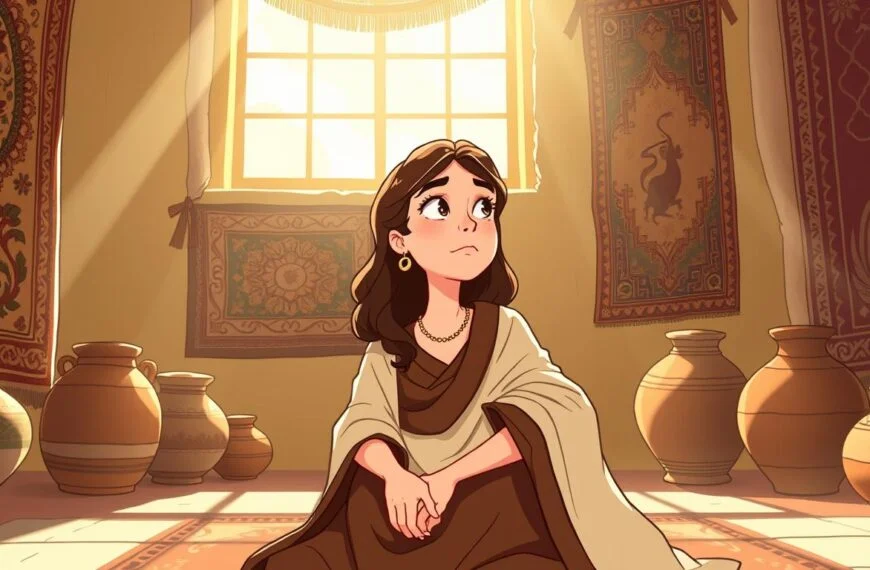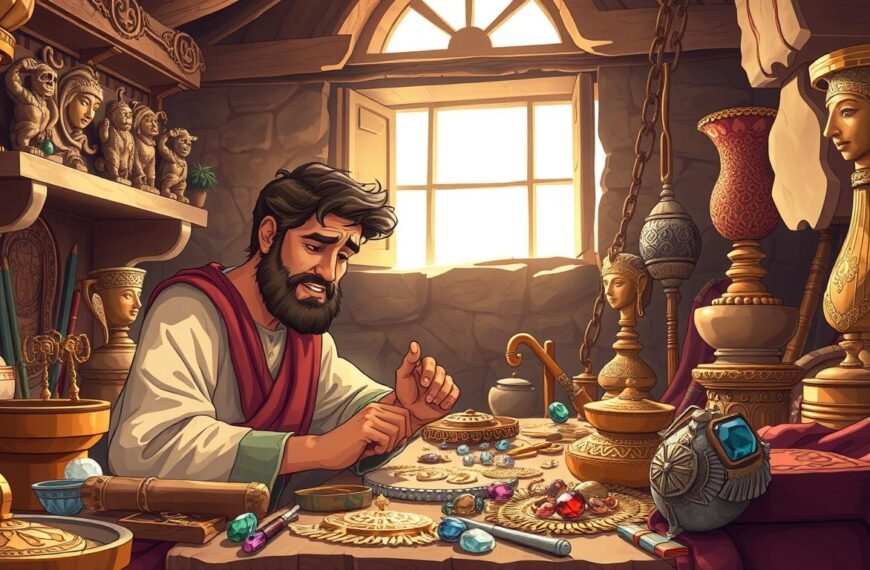Have you ever thought about living for almost a thousand years? Methuselah, the oldest man in the Bible, lived to be 969 years old. This is written in Genesis 5:21-27. His long life makes us wonder about the meaning of long lives in the Bible.
Why do some people in the Bible live so long? It’s a mystery that makes us think about the Bible’s secrets.
Methuselah’s life is very important in the Bible. He was the oldest person recorded and connected Adam to Noah. His long life helps us understand the Bible better.
It makes us think about why some people lived so long. For more on the Bible, check out what the Bible says about murder.
The Biblically Long Lives: An Overview
The idea of long lives in the Bible is really interesting. It shows how some people lived a very long time before a big flood. Guys like Adam, Methuselah, and Noah lived over 900 years. Methuselah, for example, lived to be 969 years old.
Adam lived to be 930 years old. His kids, Seth and Enosh, also lived a long time. Noah lived to be 950 years old. These stories tell us that long lives were common back then.
Understanding the Antediluvian Patriarchs
The antediluvian patriarchs are key in biblical history. They connect Adam to Noah. Their long lives, over nine centuries, make them interesting to study.
Figures like Methuselah lived 969 years. Jared lived 962 years. This shows life was longer back then. It also makes us wonder about life’s limits and the stories behind these long lives.
The ages in the Book of Genesis show a pattern. Scholars look at these numbers in many ways. They see them as more than just years.
These numbers help us understand the Hebrew people’s roots. The early patriarchs lived an average of 912 years. They mark a special time in biblical history.
Is it true that these patriarchs lived as long as said? Or are their ages symbols with deeper meanings? Studying them helps us understand human history and God’s plan.
Who Is The Oldest Man In The Bible?
Methuselah is the oldest person in the Bible, living 969 years. This makes him the longest-lived person in the scripture. His long life shows a unique part of history and is key in biblical genealogy.
Methuselah was Enoch’s son and Lamech’s father. This makes him a vital link in the family line to Noah. His life shows how these early patriarchs were connected, making him a key ancestor from Adam to Noah.

Methuselah’s long life was not alone. Jared and Noah also lived for centuries. Their long lives make us wonder about the biology and spirituality of their time. It makes us think deeply about life and God’s patience through Methuselah’s story.
Methuselah: The Oldest Person
Methuselah was the oldest man in the Bible, living to 969 years. His life is part of the biblical death records. These records show the long lives of people before the Great Flood.
Methuselah’s family tree shows he came from Adam through Enoch. This makes him a key figure in the Bible.
Age and Death of Methuselah
Methuselah died in the year of the Flood, as the Bible says. His death was linked to the Flood, making his life very important in history. His long life shows how human lifespans got shorter after the Flood.
His father, Enoch, was taken by God at 365 years. This adds to Methuselah’s story, showing both natural and divine ends.
Genealogy: Connecting Adam to Noah
Methuselah’s family tree is key to understanding God’s promise from Adam to Noah. He was Enoch’s son, Lamech’s father, and Noah’s grandfather. Each generation has important teachings.
Methuselah stood strong during changing times. His life shows faith’s continuity and God’s plan before the Flood. His story gives us a glimpse into early human history.
Notable Ancestors of Methuselah
Looking at Methuselah’s ancestors helps us understand his importance in the Bible. Enoch and Lamech are key figures. They connect Methuselah and Noah, adding depth to the biblical stories.
Enoch: A Brief Overview
Enoch was a special patriarch who loved God deeply. He lived 365 years and then went to heaven without dying. This shows his strong faith.
Enoch’s influence on Methuselah is clear. His good values and beliefs were passed down. This shows a line of righteousness leading to Noah.
Lamech: Father of Noah
Lamech was Methuselah’s son and Noah’s dad. He lived 777 years, a number full of meaning. He named Noah, knowing he would face big challenges.
Lamech’s role is crucial. He links Methuselah’s long life to the story of the Flood. Through Noah, he saved righteousness.
The Significance of Methuselah’s Age
Methuselah lived to be 969 years old. This is the longest life in the Bible. It shows his importance as the oldest man in the Bible.
His long life also shows God’s patience and mercy. Methuselah’s life was special, especially because of the Flood prophecy.
Methuselah lived right before the Flood. His name means “at his death, the sending forth of waters.” This links his age to the Flood story.
It seems God gave humanity a chance to change before the Flood. This chance was because of Methuselah’s long life.
Methuselah’s family was different. His ancestors lived about 919 years, but Methuselah lived longer. This shows God’s love and mercy for humanity.
Methuselah’s life ended just before the ark was built. This shows God’s plan was carefully made.
Comparison of Other Long-Lived Figures in the Bible
The Bible talks about people living a long time. This is interesting, especially when we look at the lives of Adam, Noah, and Jared. They lived a long time and are important in biblical history.
Adam, Noah, and Jared
Adam was the first man and lived for 930 years. His life started humanity’s history. It shows how long people lived back then.
Noah lived for 950 years. He is famous for saving animals during a big flood. His long life shows God’s favor and purpose for him.
Jared lived for 962 years. He is another example of long life in Genesis. Their long lives tell us about human sin and the chance for redemption before the flood.
After the flood, people didn’t live as long. This shows a big change in God’s favor. These long-lived figures help us understand a time when people lived much longer.
Their long lives can mean different things. They might have lived a long time or their lives could symbolize their virtues and challenges. Their ages still make scholars think and debate.
The Cultural Impact of Methuselah’s Longevity
The name Methuselah is linked with living a long life in culture. It affects literature, film, and music. His long life of 969 years sparks talks about aging and living long.
In today’s world, Methuselah stands for more than just a number. He shows how we see aging. Longevity references in art make us think about wisdom and experiences gained over long lives.
Methuselah’s story has changed how we view aging. Stories compare his long life to shorter lives later on. This shows how our views on life and death have changed.
Authors use Methuselah to talk about time and its passing. They make us think about how we live our lives. Methuselah’s story makes us think about our choices and the value of time.
Interpretations of Biblical Longevity
People are curious about the ages in the Bible. Some think these ages are real years lived. Others believe they are symbols of faith and divine connections.
Literal Interpretations vs. Symbolic Meanings
Many scholars believe in literal interpretations. They say people like Methuselah and Adam really lived for hundreds of years. Methuselah lived to be 969 years old, the longest in the Bible.
They see these ages as a sign of being close to God. They show how important being good was back then. But others think these ages are symbols. They believe they show God’s promise to people, not just real ages.
When we look at Abraham, we see a change. His life was much shorter than those before the flood. Today, we live about 73.2 years, as shown by statistics. The Bible says we live 70 to 80 years, as in Psalm 90:10.

Too Long to Comprehend: The Myth of Longevity in the Bible
The Bible tells stories of long lives, like Methuselah’s 969 years. These stories are not just about age. They carry deep spiritual meanings. Experts say these tales might show us how to live a good life, not just how long.
These stories are similar in many cultures. For example, the Buddha Vipassī lived for 100,000 years. These tales show our wish to live long and understand life’s meaning. They make us think about our place in the world.
Thinking about aging makes us wonder about life’s quality. The Bible says we should live up to 120 years. This makes us think about our faith, purpose, and life’s journey. These stories teach us to live well, not just long.
FAQ
Who is the oldest man in the Bible?
Methuselah is the oldest man in the Bible. He lived to be 969 years old. This is mentioned in Genesis 5:21-27.
What do the long lifespans in the Bible represent?
Long lifespans like Methuselah’s show God’s favor. They are key to the Bible’s stories.
Why is Methuselah’s age significant in biblical history?
Methuselah’s age links Adam to Noah. It shows God’s covenant and its importance.
How does Methuselah’s life correlate with other biblical events?
Methuselah died when the Great Flood started. His life is tied to big events in the Bible.
What role does Enoch play in Methuselah’s genealogy?
Enoch, who didn’t die, is Methuselah’s ancestor. He shows the value of faith and connection with God.
What are Methuselah’s connections to his descendants?
Methuselah is Lamech’s father and Noah’s grandfather. They are key to the Flood story.
What implications does Methuselah’s longevity have within biblical narratives?
His long life warns of God’s judgment. It shows God’s patience and mercy.
How do other long-lived figures compare to Methuselah?
Figures like Adam and Noah also lived long. Their lives tell of sin and redemption.
How has Methuselah influenced contemporary culture?
Methuselah is known for living long in today’s world. He’s in films, books, and music, showing our views on aging.
What are the different interpretations of long lifespans in the Bible?
Some think long lifespans are real years. Others see them as symbols of faith and deeper meanings.
Are the longevity stories in the Bible related to mythological constructs?
Yes, the Bible’s stories of long life are like myths. They show how ancient cultures saw the divine.

Rockin’ the faith, one verse at a time!
Growing up, the Bible’s stories deeply impacted me. Now, with over 15 years of preaching experience, I blend timeless teachings with modern technology, making them relevant for today’s world.
Bible Hub Verse is my platform to share historical insights and thought-provoking articles, exploring both familiar and uncommon Christian topics. My passion is building a welcoming online space for everyone to learn, grow in their faith, and discover the Bible’s enduring message.
Join the journey!
God bless you.









